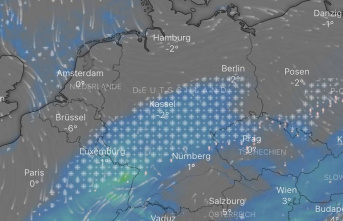Rarely has the aviation industry been so unanimous: last year's handling chaos should not be repeated in 2023. Even after the almost nationwide traffic warning strike by Verdi and EVG, airlines, airports and air traffic control are optimistic that they will be able to cope with the first heavy rush of holidaymakers of the season at the beginning of the Easter holidays. The external circumstances have by no means improved compared to the botched previous year.
"Although airlines and airports are trying to compensate for the shortage of staff and to automate processes, flight operations will certainly not run smoothly," radios the passenger rights expert Claudia Brosche from the "Flightright" Internet portal.
The company thrives on enforcing passenger claims for compensation and was already busy again in 2022 after the failed restart after Corona. Brosche conjures up the danger of renewed warning strikes, which the railway and transport union (EVG) and Verdi have all but ruled out, at least for the start of the Easter travel season.
But even without new strikes, it will be difficult enough: After the staffing crisis last year, all larger airports hired new people, says Ralph Beisel from the ADV airport association. But there is no location in the green zone, because applicants keep dropping out or not starting their job. After all, the official background check has accelerated in some countries.
Additional problems are to be expected in German airspace, which is controlled by Deutsche Flugsicherung (DFS). In the west, the French pilots, who are willing to go on strike, are reducing the routes, while in the east the Russian war of aggression in Ukraine is continuing to reduce capacities at the NATO border.
From June 12th to 23rd, the already heavily used German airspace will also be the scene of the largest air force exercise since the end of the Cold War. According to the Bundeswehr, up to 210 aircraft from 18 nations are taking part in the "Air Defender 2023" maneuver, in which, among other things, the transfer of troops from the USA to Europe is practiced.
In an international comparison after Corona, German air traffic is still on the move with slowed down. Compared to the pre-crisis level of 2019, 34.1 percent of the guests were still missing last year. The gap is expected to shrink to around 15 percent this year.
The capacities in the airspace as well as the staff remain tight, so that in the interaction of the "system partners" it depends on a new honesty, as Beisel says. At all larger airports there are regular rounds of voting in which all those involved have to disclose their actual staffing levels at peak times. Instead of competitive thinking and mutual finger pointing, the goal of smooth air traffic as possible must be pursued together.
The dress rehearsal for this at Frankfurt Airport went horribly wrong last Sunday. The main customer Lufthansa, which accounts for around 70 percent of flight movements at the largest German hub, was only able to process thousands of passengers and pieces of luggage with a delay. Recent IT problems had meanwhile paralyzed the systems.
The search for the suspected cause at a service provider is still ongoing. According to reports, there should be a different reason than on February 15, when Lufthansa's rented backup systems collapsed after an excavator cut through some important fiber optic cables on a Deutsche Bahn construction site of all places. In Munich, too, before the big Verdi warning strike, there had been considerable operational problems, caused here by air traffic control.
Nevertheless, the Lufthansa Aviation Center is optimistic about the first real endurance test at the start of the travel season. "We are operationally well prepared for the coming weekend," says a spokeswoman. As in the previous year, Germany's largest airline is using a Boeing 747 intercontinental aircraft on the unusual short-haul route to Mallorca at Easter. On the first four Sundays in April, a jumbo flies from Frankfurt to Palma and back, with 150 more passengers on board than the usual Airbus medium-haul aircraft.
The declared goal of the industry is that the Malle jumbos, like all other aircraft, can take off as planned. The German air traffic control (DFS) has significantly reduced the number of maximum flight movements per hour for the two hubs in Frankfurt and Munich. Reliability should be given priority here over the largest possible offer.
Frankfurt will only reach the original benchmark of 104 take-offs and landings again at the end of the travel season in August, as Fraport boss Stefan Schulte announced. An airport spokesman assures that Munich does not see itself hindered in operations by the new upper limit.
The Bavarians are expecting around 100,000 passengers from Friday to Sunday, and over 180,000 guests a day at Rhein-Main Airport at the start of the holiday season in Hesse and the surrounding countries. The operators urgently ask the passengers to appear at the airport in good time before departure, with little and well sorted hand luggage.











